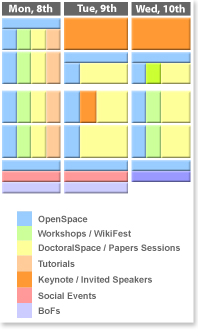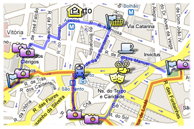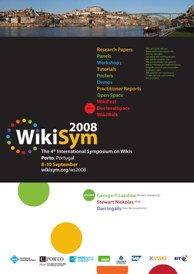From WikiSym 2008
Introduction
With Web 2.0 becoming more and more popular, people are giving more and more information about themselves away on the Internet: in social networks, blogs, chats and wikis. The younger generation especially seems to enjoy social networks and gives information about their lifestyle away freely. Have we, or will we, become Web junkies who deliberately put more or less their entire lives online?
Session Outline
The aim of this OpenSpace session was to bring together people who are interested in the non-technical perspective of the Social Web, with the following questions on our agenda. What are the benefits of the Social Web? What are the immediate dangers, and what are the possible long-term implications? And is it possible to identify personal practices for using the Social Web in a way that acknowledges the benefits and avoids the risks?
Participants
Transcript
The following is a list of ideas expressed by the participants. There wasn't always consensus among the participants, so to some degree the list may represent slightly conflicting attitudes. Ideas are classified as observations, benefits, risks and practices.
- Observation. Societies will have to accept the fact that people put (more and more) personal information online. Sooner or later, and probably sooner, it will be perfectly natural for people to use the internet as a forum for presentiung themselves.
- Observation. Right now, employers can give job candidates a hard time if there are party photos of them (or similar things) floating around on the Internet. In a few years, employers can no longer afford to do this, as there would be no people left for them to employ.
- Practice. Put information on the Internet if it represents you well. Don't be ashamed of who you are and what you are.
- Risk. There could be some group pressure (especially among youths) to put personal information online, leaving those who refuse to do this as outsiders.
- Benefit. Social networks allow people to get connected that had no chance of being connected otherwise. This is especially true for niche communities - people with common interests who had no chance to meet in the real world.
- Risk. On social net works people tend to have a large number of "friends", though probably only a few of them are "real" friends. Given this illusion of connectedness, they might miss out on "real" connections in the real world.
- Risk. If everyone is online all the time, 24/7 connectivity can distract you from important things in life (like if you were watching TV all the time).
- Observation. Apparently people are less easily distracted if they use a "limited" interface to the Internet (such as a mobile phone as opposed to a computer screen).
- Observation. Annonymous communities (where people don't register with the real name) seem to invite rude behaviour. Also, in an anonymous environment you don't know who you're dealing with and you can't take credit for the good things you've said or done.
- Practice. Prefer non-anonymous communities over anonymous communities.
- Risk. If you use the Social Web (e.g. gmail) for managing all your contact information, you make yourself dependent of the owners of the sites you use. Should you lose your account, email addresses, contact information, blogs etc. might all be gone.
- Observation. Social networks with an open architecture (such as Facebook) offer many more options as compared to networks were all you can do is enter personal data into a well-defined data scheme.
- Risk. Applications offered by networks with an open architecture (such as Facebook) may be more powerful, but there's always the risk that the owners of that network learn more about you than you want them to (e.g. when Facebook learns about what books you buy off Amazon).
- Pratice. Be sure to switch off applications if you're unhappy with them. In order to be able to that, check out what mechanisms are being used.
- Practice. Distribute information about yourself. Use different (perhaps more specialised) communities for special purposes rather than putting everything about yourself online in just one social network.
- Practice. Give people a somewhat complete impression of yourself. Describe what your are and what's important to you (e.g. through a long-term blog), so that people get a good impression of you.





























